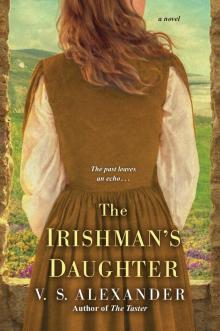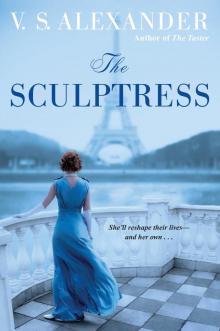- Home
- V. S. Alexander
The Irishman's Daughter Page 7
The Irishman's Daughter Read online
Page 7
He put his arms on either side of her so she couldn’t escape from the door. “Yes, but he hasn’t been my friend.”
The door shook and Briana struggled to hold on to the latch.
“Let me out,” Lucinda called out in English. “What kind of childish prank are you playing?”
“I refuse to speak that language,” Rory said. “She can talk all she wants, but I’ll answer in Irish.”
Briana let go of the latch and stepped aside. Lucinda burst out of the cottage, her face red with frustration. “What is going on out here? Are you two conducting a tryst? If so, you’re far from hiding it.”
Briana laughed and made up her mind to follow Rory’s lead in speaking Irish. She doubted that Rory knew what a “tryst” was.
Lucinda had powdered her face, painted her lips, and adorned herself with pearl-drop earrings and a simple gold necklace. Briana had never seen the jewelry before. They must have been articles purchased in England. The dress she wore, red, with pleats, was more common than the one she had arrived in. Still, her sister’s appearance made her feel dowdy.
Lucinda smoothed her dress and stood waiting for an answer. When none came, she said, “We’ll be late helping Father at Lear House. . . . If you’ll excuse us, Mr. Caulfield, we have business to attend to.”
“Mr. Caulfield is going to fight Mr. Donlon at noon tomorrow in the village center,” Briana said.
Lucinda gazed at Rory with amazement. “A fight! It’s barbaric how men use their fists to solve problems. They should be penned and castrated like common farm animals. We have enough troubles.” She scowled.
Briana gaped at her sister, whose sour expression had turned to a self-satisfied smirk. She grasped Rory’s hand but looked at Lucinda. “Sometimes, sister, you amaze me.”
Lucinda pulled her away from Rory. “We’ll be amazed by Father’s curses if we don’t get down to the manor. He needs our help. Good day, Mr. Caulfield.”
Rory bowed to them both and then walked ahead.
Lucinda ushered Briana down the path and looked to the sky, her right hand covering her eyes. “The sun won’t be out for long.” She pointed to a line of gray clouds sliding in from the northwest. “The Stags of Broadhaven will get a lashing today.”
* * *
The clouds covered the sun by mid-afternoon, turning the sky a mottled ash. The inside of Lear House was no better. Briana found the dim library as oppressive as the day. “Do you want me to open the shutters?” She stood near the windows, which were covered by the heavy wooden slats.
Brian bent over the desk but said nothing. Not wanting to be bothered, he waved her away in a gesture that she had seen many times before. Numerous ledger books lay opened before him. In one, he wrote his notes by the light from the lamp he had set out on the library desk.
Rebuffed by her father, her head swimming with numbers, she walked to the great room, where Lucinda sat reading on the settee. Briana, pressed against a pillow, took her seat at the opposite end. A morose light entered the expansive windows, allowing her sister enough illumination to see the printed page. Lucinda put down the novel.
Briana lifted the book and read its cover: Sybil, or The Two Nations, by B. Disraeli, M.P. “Is it good?” The question was innocuous but a needed diversion after going over the accounts with Brian.
Lucinda slumped against the silk back of the settee and sighed. “I’m sorry I carried it from England, but Sir Thomas insisted.” She flicked her fingers at the book. “Dreary as a December day, if you ask me. It’s about the lower classes in England. Sir Thomas gave it to me as a primer on how not to live.”
Briana pushed the book between them and inched closer to her sister. “You’ve adopted a different attitude since you’ve become a governess. You’ve changed.”
Lucinda looked at her with surprise. “How so? I certainly don’t feel it—only a little older and wiser. Governing three boys has forced me to grow up in ways I never imagined, and it’s given me an education in the higher social classes that I would never have received here.”
“That’s what I’m talking about, sister. You only speak English. You put on airs, as if we are the lower class. You’ve become affected.”
Lucinda stiffened on the settee. “I suppose that remark could be taken as an insult, but I prefer to think of it as a compliment. I have been affected by my experience as a governess, meeting people of a high standing in Manchester and London. It’s shown me that there’s a world beyond County Mayo.”
“I’m sorry, I don’t intend to be rude, sister,” Briana said. “In fact, I want us to be closer, but I feel we’ve drifted apart as the distance between us has grown. That’s natural, I suppose.”
Lucinda leaned toward her and grasped Briana’s hands. “Haven’t you ever desired to get away from Lear House, to see beyond it, to experience more than the churn of the surf and the incessant screech of the wind? Sir Thomas has made that all possible for me because I studied hard when I was a child. When the time came, I was prepared to accept his offer.”
Briana withdrew her hands. “Yes, you read while I worked—’tis true. But I’ve no desire to spend my days with stuck-up or stuffed-up boys. I imagine Manchester and London to be wretched when it pours, even worse than our home . . . here I have the sea, the cliffs, and the fields. They’re all the company I need.”
Lucinda clasped her hands. “You have more than that. Everyone knows your desire for Rory Caulfield.”
She blushed at her sister’s reference. “Yes, we’ve been friends for years and our affection has grown, slowly, respectfully, but we’ve both held back from displays of emotion.” She glanced sideways, avoiding her sister’s stare. “There’s been little time for that with you being away and Rory taking care of the farm. Besides, our relationship is more than desire.”
Her sister didn’t blink at the assertion. “Affection? Emotion? Desire? What about love? That’s a word you’ve never used in respect to any man except our father.”
“I know you and Father are opposed to any union between us.” She uttered the words almost without thinking, exposing her deepest fear to her sister. She had to face the fact that she loved Rory without reservation and that she must counter whatever objections were raised. Did it really matter if Lucinda opposed her marriage? Briana was certain that her sister’s resistance would thrive upon on the fertile grounds of economics and worldly matters that only those living outside of Carrowteige, perhaps even Ireland, could embrace. Who was Lucinda to talk of love? The real demon in her head came from her father, whom she wanted to be happy. It was Brian’s love that had buoyed her through the years, and in that devotion she found it hard to introduce Rory into a perceived emotional upheaval possibly filled with guilt or betrayal.
Surprisingly, Lucinda scoffed. “Far be it from me to sway your heart—I’ve never been able to do that. Father, I imagine, will have the last word on Rory Caulfield—as he should. He thinks you can do better, and if you would look beyond Lear House, you might find that’s true.”
Her sister’s words jabbed her, and a wave of irritation skittered over her. “And what about you? Do you pine for Sir Thomas, the eligible owner?”
A blush colored Lucinda’s face, and she shifted her gaze to the floor to avoid the question.
Briana noted her physical response and said, “I have my answer.”
Lucinda looked back at her with determination. “My relationship with Sir Thomas is strictly one of business. Any show of affection would violate the contract between employee and employer.”
“All business? So, such thoughts have never crossed your mind?”
“Don’t press me, Briana. I have as much a stake in Lear House as you do. If you took the time to look beyond shallow observations, you might find that I, in fact, am more concerned about keeping our fortunes together than you.”
Briana rose from the settee and stood in front of the window looking out at the gray clouds scudding over the bay. She felt ashamed of her pointed attack on Lucinda, who
had done nothing wrong but take on a paid profession and keep in the good graces of the manor’s owner. Perhaps she was jealous of her travels, her knowledge of the world. She couldn’t bring herself to say she was sorry, but she turned and said, “If you are concerned as I am about our future, then we’ll see eye to eye. For that, I’m grateful.”
Briana and Lucinda jumped when a loud bang echoed through the hall. They ran to the library to find their father standing over the desk, his hands planted firmly on the top, his face hidden from view. He slowly raised his head as they entered.
Briana had never seen him in such a state, face flushed, eyes wide, and wispy hair streaming like silver lightning bolts from his head. “What’s wrong, Da?”
He drew in a breath. “Damnation. . . . Sir Thomas isn’t going to be as understanding as I am. More money is going out than coming in. The tenants have been in arrears for months and I’ve been looking the other way, but this can’t continue. I understand they have nothing to give. . . .” He gazed at the pile of books on the desk. “I beg and there’s nothing to give. They sell the crops they can but have no food to eat thanks to the rot.” He put his hand on one of the massive ledger books. “Slamming this book on the table probably didn’t help the potatoes in the ground.”
“If you wanted to startle us, you succeeded,” Lucinda said.
Briana asked the one question she thought would make her father feel better. “Can I get you something to drink?”
He sank into his chair and called them to his side. “No, stand here. Keep me company. I have something to show you.”
“I fear for his health and mind,” Briana whispered to Lucinda as they walked to the table. They parted and took their places on either side of him, Briana on his right and Lucinda on his left.
He opened the ledger to the most recent entries and pointed to the pages carefully inscribed in brown ink. “Look.”
Briana looked at the left-hand top page and worked her way down the sheet. It was divided into five columns. The second in from the right was marked Collections, the final row, Owed. The Collections column had a few notations at the top, but none going forward from midpage. The Owed column was filled with notations. The sums were small but added up to greater debt. Knowing the current output of tenant farmers, she could see little relief for those who resided on Lear House lands. The right-hand page was mostly empty except for a few zeros that her father had already filled in.
Briana stepped away from the book to the darkened windows. The room, already gloomy, threatened to crush her in its sad reality. She had grown up with the tenants named in the book. She had played with the children born here, helped out when people needed a hand, sung and danced with them at fairs. To see them in such peril clawed at her heart. Even the man who had worked his way into her heart was falling behind. And there were others on the grounds whom she knew only by sight. Tenants were subdividing their own property to relatives as families swelled. The implication was clear. Briana turned to see her father sitting in the chair behind the desk, his face pale and drawn in the lamplight.
He closed the ledger. Lucinda said nothing.
“I can pay Sir Thomas an eighth of what he is owed this month of April—if that,” he said. “Next month there will be nothing.”
It frightened her to see her father so vulnerable to circumstances outside his control. The new potato crop might be failing after the wet winter and damp spring. The winter sea with its cresting swells had been so dangerous in the long, dark months that even the bravest men had forsaken the waves. The small curraghs weren’t built for such bad weather.
“Let me put it plainly. We may face eviction if the estate cannot come up with the monies owed.” Her father sank back in his chair.
“That’s impossible,” Lucinda said. “Sir Thomas would never turn us out.”
Briana, hands clasped in front of her, strode to her sister. “Wouldn’t he?” Her ears felt as if they were on fire from anger. “Why not? He has every right to. Do you know something about the owner’s charitable attributes that we don’t? Do you feel you can save us from these unfortunate circumstances through Sir Thomas’s goodwill? Perhaps you can use your charms to soften the blow.” She regretted her words, but the anger in her body had turned to panic.
Her father looked at her with disgust. “Hush, Briana. It will do no good to defame your sister or Sir Thomas.” He pushed the ledger away, causing one of the other books on the desk to crash to the floor. This, in turn, caused his voice to rise. “I will not have my daughters at each other’s throats during this crisis,” he shouted. “Clear heads are needed in troubled times.”
The thump of the book and her father’s words drained the anger from her body. She faced her sister. “I’m sorry. I spoke in haste. . . . ”
Her sister glared at her, surrendering not an inch of goodwill.
“I will tell you both something that I’ve kept to myself,” Briana continued in a softer tone. “I’m not going to apologize for my action, because I felt it was necessary, but now I see it was futile.”
Her father shifted uneasily in his chair. Lucinda looked at her with unforgiving eyes.
“I wrote a letter to you, sister, that you never received.”
Her sister’s face softened a bit. “I’m touched, but your letter never reached me.”
“I have no ready explanation for that, except a supposition,” Briana said. “Perhaps Sir Thomas delivered only the letters he wanted you to receive.” She paused to steel herself against a harsh reaction from her father. “October past, I wrote you to ask Sir Thomas to take pity on the tenants and our family.”
Brian rose from his chair, his face etched with fury. “You what?”
She stood her ground, undaunted by her father’s anger. “I did it for us and the tenants. I saw what was happening. Rory showed me the plague—you know that. It was no secret last fall. Now, it’s worse—”
“You had no right to stick your nose in the affairs of Lear House.”
Briana patted her hands in the air, attempting to calm her father. “What do you think I am—a chambermaid, a servant of this house? No, I’m much more than that. I love this house and want to remain here. It would kill me to lose it. Sir Thomas needs to know what is happening on his land. I asked him to forgive our debts for a time.”
“Very biblically stated, sister,” Lucinda replied. “I would argue that our landlord is a businessman who has obligations, but one of good heart. I’m no authority on the matter, but I surmise that the rents from Lear House contribute to Sir Thomas’s ability to pay for his Manchester estate. Even the rich have responsibilities. This latest news would be most distressing to him. Still, I can’t imagine that he would evict the tenants.”
“Well, it makes no difference,” Briana said. “The letter was lost, or not delivered to you. . . . Regardless, it made no impression on the owner.”
“I hope to God it was lost,” Brian said. “It’s something an idiot would do. It’s the Lord’s miracle that Sir Thomas did not come down upon my head.” He returned to his chair. “I’ve made excuses for the tenants in my letters to him. I’ve told him the dwindling payments would be made up with interest.”
“Well, this idiot is not waiting to be thrown out upon the road,” Briana said, feeling that she was justified in writing the letter. “If you would like to join me in coming up with a plan to save our home, we can discuss it at our evening meal. I’m headed to make soup from the seed potatoes we’ve saved.”
Her father said nothing. She walked to the library door and then turned. Brian’s face was partially covered by his hands, which formed a steeple of fingers around his head. “Go on,” he said. “I’ll be there in a few minutes. I need to think. I’ll close up the house.”
“Don’t be long,” Lucinda said, joining Briana.
As they walked to the cottage, Briana trailed her sister, who had little to say as they crossed the lawn, now damp and slick from a light rain.
“I find it disturbing th
at I never received your letter,” Lucinda said when they reached the cottage. “You’re right. These times aren’t good for us—even worse for Father. We should plan for our future.” Lucinda opened the door, and they stepped inside.
The turf fire warmed her, slaking the damp from her clothes. She marveled that her sister had come to a similar conclusion about the blight when she most likely would resume her duties abroad as a governess. “So you’ll stay at Lear House?”
Lucinda rubbed her hands over the fire. “I didn’t say that. I said we should plan for our future.”
Her mind raced. What thoughts could she offer as they dined? What scheme could she come up with? How could they save Lear House? Try as she might, no plan came to mind. She feared that if they didn’t think of something soon, her family would be no better off than the one they had encountered at the river.
CHAPTER 5
Rory stood in the doorway of his cabin and stuck his hand out in the rain. Cold drops gathered in his palm. He let them collect in a small pool and then shook them off, wiping his fingers on his breeches. The fog and low clouds swirled over the sandy bay, lifting, dropping, circling in a hazy mist. He imagined Connor Donlon, bare chested, muscles solid as granite, swooping, dropping, circling as well, as he thrust his fists at Rory in the village center. The fight was in less than an hour.
The turf fire had burned all night in his cabin. Each time sleep nearly found him, he woke startled by the blazing fists of his opponent haunting his dreams. Briana also chastised his fight while he slept.
Women don’t understand these things. Men must take a stand. It’s about pride; no, something more—survival—the right to call yourself a man, a protector. Briana would never understand that argument; Lucinda even less so. What was she teaching those pampered young Englishmen about manhood? To be men or fops?
The bitter taste of disgust stung his mouth even as he chuckled about Lucinda’s comment about castrating Irishmen for fighting. Only he and Connor could be hurt by this challenge. The village might find it entertaining on a dreary day. He half expected Briana to show up, ordering him to call off the fight or pay the consequences. She had become a strong woman with a mind of her own since the rot had taken the crop. That was one of the many reasons he loved her. In his eyes, Briana, even more so than her sister, was able to think on her feet, to be independent of others. She was the one who cooked, cleaned, helped care for the animals, and sewed with the women while Brian managed the books.

 The Irishman's Daughter
The Irishman's Daughter The Sculptress
The Sculptress The Taster
The Taster Her Hidden Life
Her Hidden Life The Magdalen Girls
The Magdalen Girls